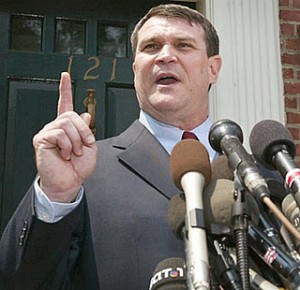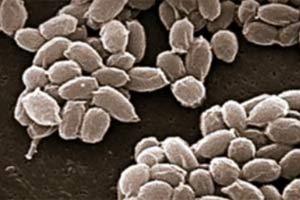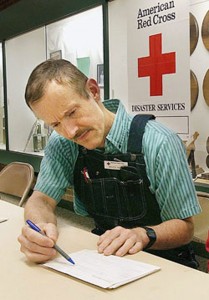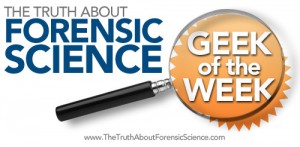The Forensic Science Geek of the Week
Please visit the www.TheTruthAboutForensicScience.com FaceBook fan page.
The week 68 “www.TheTruthAboutForensicScience.com Forensic Science Geek of the Week” honors goes to: Dr. Barbara Vonderhaar, PhD.

- Dr. Barbara Vonderhaar McShane, PhD is our Geek of the Week
According to the website of Geek, the following is offered:
Dr. Barbara Vonderhaar, PhD is a Scientist Emeritus with the National Institutes of Health-National Cancer Institute-Cell and Cancer Biology Branch.
Dr. Vonderhaar received her Ph.D. from the University of Wisconsin-Madison. After postdoctoral training in mammary gland biology with Yale Topper at the NIH, she joined the NCI where she studies prolactin action in breast cancer. She was the first to purify a prolactin receptor from any source and the first to characterize a monoclonal antibody directed against the human prolactin receptor. She was also the first to demonstrate that human breast cancer cells synthesize and secrete significant amounts of biologically active prolactin. She serves as Chief of the Mammary Biology and Tumorigenesis Laboratory, Co-Chair of the Breast and Gynecologic Malignancies Faculty, Co-Chair of the Cancer Stem Cell Consortium and Co-Chair of the Intramural Program for Research on Women’s Health. Dr. Vonderhaar is a member of the Senior Biomedical Research Service.
Congratulations to our Forensic Science Geek of the Week winner!
OFFICIAL QUESTION:



1. Identify what is depicted in the three pictures?
2. How are they all interlinked?
3. What importance do they have in the world of forensic science?
4. What is the most current information about it?
Our Geek of the Week answered:
The man pictured at the top is Steven Hatfill, a bio-weapons expert who was first investigated as the person responsible for the high-profile terrorist campaign of anthrax attacks immediately after 9/11 in which five people were killed and another 17 injured. He was eventually exonerated. Another suspect, Bruce Edwards Ivins (pictured at the bottom), became the focus of investigation in April 2005. Ivins was a scientist who worked at the government’s biodefense labs at Fort Detrick in Frederick, MD. On July 27, 2008, Ivins committed suicide after learning that murder charges were about to be filed against him. A report published in February 2011 by the National Academy of Sciences concluded that the FBI did not have enough scientific evidence to produce a conviction, had the case gone to trial. Among their many criticisms, the authors found that the link between the anthrax used in the attacks and a supply which Dr Ivins kept in his lab was “not as strong” as the agency suggested. They found that, although the type of anthrax used in the letters was correctly identified as the Ames strain of the bacterium, there was insufficient scientific evidence for the FBI’s assertion that it originated from Ivins’ laboratory. A recent article published in the Journal of Bioterrorism & Biodefence also highlighted several inconsistencies in the forensic evidence against Dr Ivins, raising speculation that the FBI got the wrong man, and then prematurely closed their investigation following his death. The report, co-authored by three scientists, says that detectives failed to properly analyze the dried anthrax spores (the middle picture) that were used in the attacks, which took place over several weeks following the September 11 bombings in 2001. Analysis of the white powder, which was sent through the postal service to news organizations and politicians, showed that it contains unexpected traces of tin. That suggests a high degree of manufacturing skill, contrary to official conclusions that the attacks were part of a relatively-unsophisticated
campaign carried out by Dr Ivins alone.
[BLOGGER’S NOTE: What a great answer. Thank you for participating. Congratulations on being our Geek of the Week.
Frontline on PBS did an amazing documentary. It was called Frontline: The Anthrax Files. I would commend that to you to watch:
]
The Hall of Fame for the www.TheTruthAboutForensicScience.com Forensic Science Geek of the Week:
Week 1: Chuck Ramsay, Esquire
Week 2: Rick McIndoe, PhD
Week 3: Christine Funk, Esquire
Week 4: Stephen Daniels
Week 5: Stephen Daniels
Week 6: Richard Middlebrook, Esquire
Week 7: Christine Funk, Esquire
Week 8: Ron Moore, B.S., J.D.
Week 9: Ron Moore, B.S., J.D.
Week 10: Kelly Case, Esquire and Michael Dye, Esquire
Week 11: Brian Manchester, Esquire
Week 12: Ron Moore, B.S., J.D.
Week 13: Ron Moore, B.S., J.D.
Week 14: Josh Lee, Esquire
Week 15: Joshua Dale, Esquire and Steven W. Hernandez, Esquire
Week 16: Christine Funk, Esquire
Week 17: Joshua Dale, Esquire
Week 18: Glen Neeley, Esquire
Week 19: Amanda Bynum, Esquire
Week 20: Josh Lee, Esquire
Week 21: Glen Neeley, Esquire
Week 22: Stephen Daniels
Week 23: Ron Moore, B.S., J.D.
Week 24: Bobby Spinks
Week 25: Jon Woolsey, Esquire
Week 26: Mehul B. Anjaria
Week 27: Richard Middlebrook, Esquire
Week 28:Ron Moore, Esquire
Week 29: Ron Moore, Esquire
Week 30: C. Jeffrey Sifers, Esquire
Week 31: Ron Moore, Esquire
Week 32: Mehul B. Anjaria
Week 33: Andy Johnston
Week 34: Ralph R. Ristenbatt, III
Week 35: Brian Manchester, Esquire
Week 36: Ron Moore, Esquire
Week 37: Jeffrey Benson
Week 38: Pam King, Esquire
Week 39: Josh Lee, Esquire
Week 40: Robert Lantz, Ph.D.
WEEK 41: UNCLAIMED, IT COULD BE YOU!
Week 42: Steven W. Hernandez, Esquire
Week 43:Ron Moore, Esquire
Week 44: Mehul B. Anjaria
Week 45: Mehul B. Anjaria
Week 46:Ron Moore, Esquire
Week 47:Ron Moore, Esquire
Week 47:Ron Moore, Esquire
Week 48: Leslie M. Sammis, Esquire
Week 49: Ron Moore, Esquire
Week 50: Jeffery Benson
Week 51: Mehul B. Anjaria
Week 52: Ron Moore, Esquire
Week 53: Eric Ganci, Esquire
Week 54: Charles Sifers, Esquire and Tim Huey, Esquire
Week 55: Joshua Andor, Esquire
Week 56: Brian Manchester, Esquire
Week 57: Ron Moore, Esquire
Week 58: Eric Ganci, Esquire
Week 59: Ron Moore, Esquire
Week 60: Brian Manchester, Esquire
Week 61: UNCLAIMED IT COULD BE YOU!
Week 62: UNCLAIMED IT COULD BE YOU!
Week 63: Ginger Moss
Week 64: Richard L. Holcomb, Esquire
Week 65: John L. Buckley, Esquire
Week 66: Jeff Sifers, Esquire
Week 67: UNCLAIMED. IT COULD BE YOU
Week 68: Dr. Barbara Vonderhaar, PhD.
Week 69: UNCLAIMED. IT COULD BE YOU



